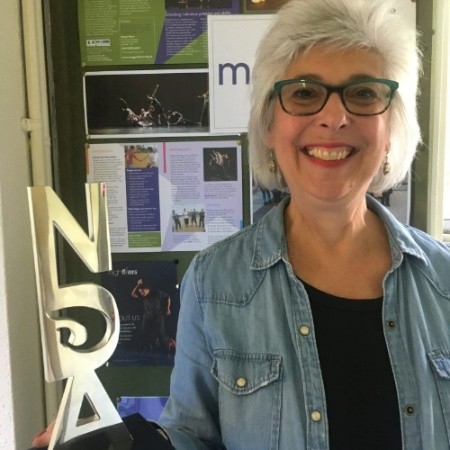Avril, founded Magpie Dance over 30 years ago, and has dedicated her life to empowering people with learning difficulties and other needs through dance. Based on her experiences, Avril now advises others on diversity and inclusion as part of her wider consultancy practice, and I believe there is much that we can learn from Avril in the pursuit of neurodiversity.
We met earlier this year. We spoke about autism, neurodiversity and what is possible when you provide people with the opportunity to flourish, no matter what their needs. To say I was blown away by her is an understatement. She has done so much for so many people. What struck me most about Avril was her quiet calmness, and her humility.
I knew then that Avril was someone I wanted to stay in touch with, and I am excited to have Avril as my first Neurodiversity ally on Me.Decoded.
This is her insights.
‘We must be the change you want to see in the world’ Mahatma Gandi
I was heartened to see on a recent visit to Liverpool an exhibition of the Umbrella project 2018 celebrating the gifts, talents and employability of those with ADHD and Autism. It is part of a wider education project to celebrate neurodiversity, raise awareness and challenge stigma and discrimination. The umbrellas celebrate the unique gifts of every child, and are signed by a child stating ‘My unique Super Power is…’
Participating schools in Merseyside, Salford and Manchester, with the support of local councils and businesses, have joined together to ensure that our cities are ‘child friendly’ and places of opportunity for every child to be happy, healthy and achieve their potential’.
So what is neurodiversity…?
I like this personal explanation of neurodiversity.
[it is the view that] neurological differences like autism and ADHD are the result of normal, natural variation in the human genome... We are realizing that autism, ADHD, and other conditions emerge through a combination of genetic predisposition and environmental interaction; they are not the result of disease or injury. John Elder Robinson, My Life with Asperger’s
Embracing diversity
Raising awareness of what it means to celebrate difference needs to start early in schools, or before, in order that it is an integral part of how we live and grow up.
What if the ‘Umbrella project’ happened in towns and cities across the UK in a bid to raise awareness of young people who may learn differently, have a lot to offer and are able to ‘achieve their potential’?
It would greatly help their peer groups to grow up with the knowledge of what it means to embrace difference, making it less of an issue in later life.
‘When embraced, diversity can act as a source of creative potential’. Nick Walker, Autistic UK
Furthermore local authorities and businesses across the UK need to get involved, thus raising awareness further.
For businesses their employees will see that the workspace can be a more diverse environment. The importance of recognising and celebrating difference needs to be a fundamental value embedded in society, starting as early as possible; unfortunately it is not always the case.
The model behind Magpie Dance
In 1985 I founded Magpie Dance [1] , an organisation working with people of all ages with a range of learning abilities and needs, including some who were autistic. I realised from very early on that individuals can flourish and ‘achieve their potential’, given the right environment.
Magpie Dance was founded on the social model of disability [2] . Its founding values are ‘not a one size fits all’ and ‘unlocking individual potential and ability’; recognising that we are all individuals in our own right with a range of diverse needs and learning requirements.
The skilled facilitators I developed in the organisation all worked on the premise that we can’t fit a square peg in a round hole. Rather that we need to respond to and nurture the creativity that is innate in all individuals instead of imposing ideas on individuals who access the projects.
Magpie Dance has had performances in The Southbank, Trafalgar Square, Sadler’s Wells and other venues across the UK. Through this work, audiences and communities were more aware that we can celebrate and value difference by recognising the unique talents of each individual.
What I have learnt about unlocking potential
Firstly it is far more beneficial to have open expectations and not to make assumptions about what someone can or can’t do. If we give individuals the space and support to achieve beyond expectations then that individual will flourish. I have witnessed this time and time again – challenging my own expectations and assumptions.
I remember a project which was part of a choreographic mentoring scheme, where we had two choreographers with a learning disability working with four professional dancers. The dancers were put through their paces in a challenging work, which was performed at a number of professional venues to great acclaim. The piece was 30 minutes long with complex patterns, lifts and ideas. When I went in to watch rehearsals I was ‘blown away’ by the work produced. My expectations were challenged about what was possible. It proved to me that there are no limits, and highlighted that without opportunities we won't know what lies beneath the surface.
The piece reinforced that we must not ‘close people down’ to limit the expectations of what can be achieved.
‘Society in general has low expectations of what people with a learning disability can achieve in most areas of their lives. Avril has turned this approach on its head and I have seen people with a learning disability dance with grace, passion and skill. While watching Magpie Dance perform, I don't see people with a learning disability dancing. I see individuals collaborate to deliver beautiful and meaningful performances.’ Magpie Dance supporter.
We need to listen to, respect and nurture individuals to develop their skills and confidence, to have a self – belief in their own abilities. Once we achieve this, I believe there are no limits.
Embracing neurodiversity in the workplace
I see many parallels between what I learnt at Magpie, and the movement to embrace neurodiversity. The question I have is why some organisations don’t apply these values to their workforce?
Surely by recognising and celebrating neurodiversity in the workplace, the environment will be a richer more inclusive, happier and diverse place to work? Yes happier, because employees who are happy and valued in their environment will produce more for the business.
‘Adjusting their recruitment, selection and career development policies… Perhaps the most surprising benefit is that managers have begun thinking more deeply about leveraging the talents of all employees through greater sensitivity to individual needs.’ Harvard Business Review.
Organisations can bring about this change with increased awareness, staff training and open honest frank communication within their leadership and teams. Shifting to a culture where individuals can communicate if there are problems or challenges, could enable them to ‘achieve their potential’.
Employees are the greatest asset an organisation has, however this is not always recognised or valued enough. Given the right environment, individuals can flourish and feel confident to speak out making meaningful contributions.
My team and I ran numerous training workshops around inclusion, diversity and communication for people in business, the arts, education and health professions. I will always remember in one training session an employee said in the feedback that ‘I won’t be afraid to speak up in-front of my colleagues’. How many people do you know, who could have been in this situation? Valued employees who feel confident to speak up, will bring more to their work and ultimately the business.
We must challenge the landscape to embrace all differences; individuals with a range of requirements need to flourish in the workspace, and feel comfortable.
It’s not just employees; employers need to acknowledge and respond positively to the neurodiversity in their teams to get the best for their businesses. Workspaces need to have open expectations and make opportunities for their entire workforce to flourish. According to McKinsey & Co, diverse organisations are 35% more likely to outperform their competitors.
Look around; it is all of our collective responsibilities to make the change now. I challenge you to start making neurodiversity and inclusion an integral part of how we live and work and not an ‘add on’.
“Our lives begin to end the day we become silent about things that matter.” Martin Luther King


